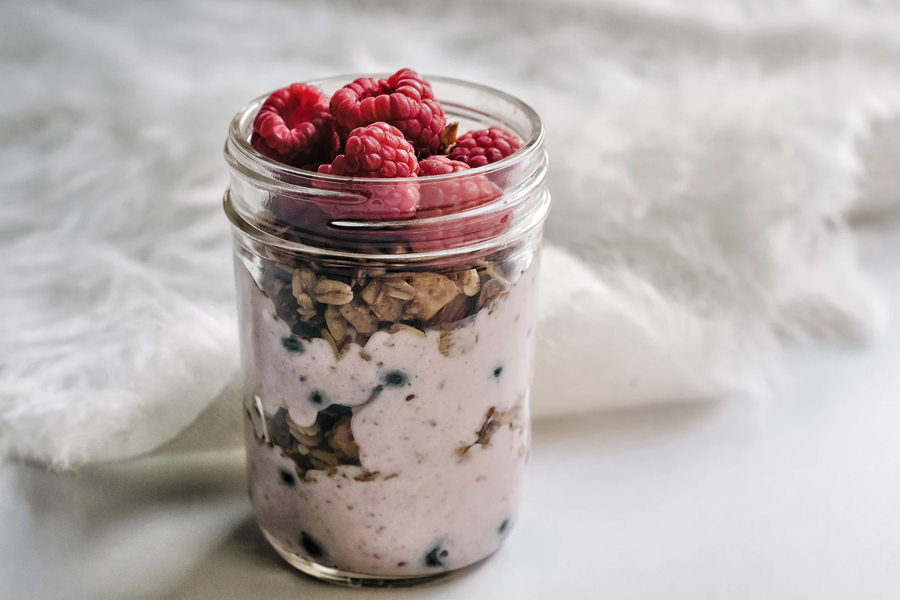7 Late-Night Snacks That Won’t Harm Your Health Or Make You Gain Weight
By Nutra Active Team

There you are – rummaging through your kitchen cabinets in the middle of the night, trying not to make too much noise and stir your family from their sleep.
It’s late, you’re hungry, but you’re conflicted about whether satisfying these nighttime hunger pangs will jeopardize your health. After all, studies have shown how weight control can be more difficult when you eat too late at night.
Picking the right foods (those under 200 calories), fortunately, has been shown to be generally okay for your health, even when taken at night. Plus, some snacks may even give you better sleep! The key to snacking at night is knowing which foods are safe to eat and which ones to avoid.
Below is a list of healthy snack ideas for when that late-night hunger pangs catch you unawares.
Banana W/ Almond Butter
A small banana along with a tablespoon (16g) of unsweetened almond butter gives you a light snack (below 200 calories) that is also potentially sleep-inducing.
Bananas have been linked to increased melatonin – the hormone known for regulating the sleep-wake cycle – in blood levels. On top of that, almond butter (or almonds in general) is known to provide magnesium, which may support the production of melatonin in your body as well. Combining both foods together doesn’t just fill you up, but also tucks you in soundly for the night!
Pistachios
Pistachios are also another source of melatonin. Compared to other plant foods, they stand in a league of their own for just how much of the hormone they contain. For example, just an ounce of shelled pistachios has about 6.5 mg of melatonin. To give you some context, just 0.5 to 5 mg of melatonin is recommended for aiding sleep. Grabbing a handful of these nuts from your kitchen gives you about 160 calories – well below the 200-calorie limit.
Hot Cereal
Usually reserved for breakfast, you might be surprised at how effective hot, whole-grain cereals like oatmeal can be for winding down at night. While oatmeal is a good source of fiber, you can even turn cooked barley into hot cereal by adding milk as well as toppings such as nuts, cinnamon, or dried fruit. Barley, oats, and rice (notably, red or black rice) also happen to be good sources of melatonin. While some whole grains take longer to prepare, once you do prepare them in advance, all you need to do is add some water and reheat them before they’re ready to be eaten.
Yogurt
Yogurt is a high-protein food that’s also rich in calcium. Besides maintaining the strength of your bones, yogurt (more so for Greek yogurt) has high amounts of casein protein. According to studies, consuming casein protein at night may help to lower one’s appetite the next morning. Its calcium content has also been linked to getting better sleep.
Eggs
Having two large eggs as your nighttime snack gives you less than 150 calories and about 12 grams of hunger-satisfying protein. While eggs are usually thought of as breakfast staples, they can be utilized quite flexibly for a number of snack variations.
For example, there are multiple scrambled eggs recipes online that require you only a few minutes to whip up. You could also prepare some hard-boiled eggs in advance to store in your fridge – perfect for when those late-night stomach rumblings hit. If you’re really looking for something that satisfies your belly, you might even use them as a spread for crackers or as part of a scrambled-egg muffin recipe.
Low-Fat Pineapple Smoothie
Smoothies are an easy way to sneak in important nutrients to your diet without the added effort that comes with preparing meals. Using 8 ounces of low-fat, protein-rich milk along with 110 grams of frozen pineapple for a smoothie blend, you can get a tropical late-night treat that amounts to only 160 calories! The low-fat milk provides protein that can help with muscle repair, as well as tryptophan that is linked to the production of serotonin and melatonin – again, helping with your sleep.
Crackers and Cheese
Having a balance of both carbs and protein in your foods can help with maintaining blood sugar levels, so whole-grain crackers with cheese are actually a great combination for late-night snacking as blood sugar levels may tend to fluctuate more during the night. Moreover, the combination of a high-carb food like crackers with a source of tryptophan like cheese can help increase tryptophan’s availability to your brain. To stick to the 200-calorie limit, aim for fewer than 4 whole-wheat crackers (1 serving, 16 grams) and reduced-fat cheddar cheese (1 stick, 28 grams) for approximately 150 calories.
